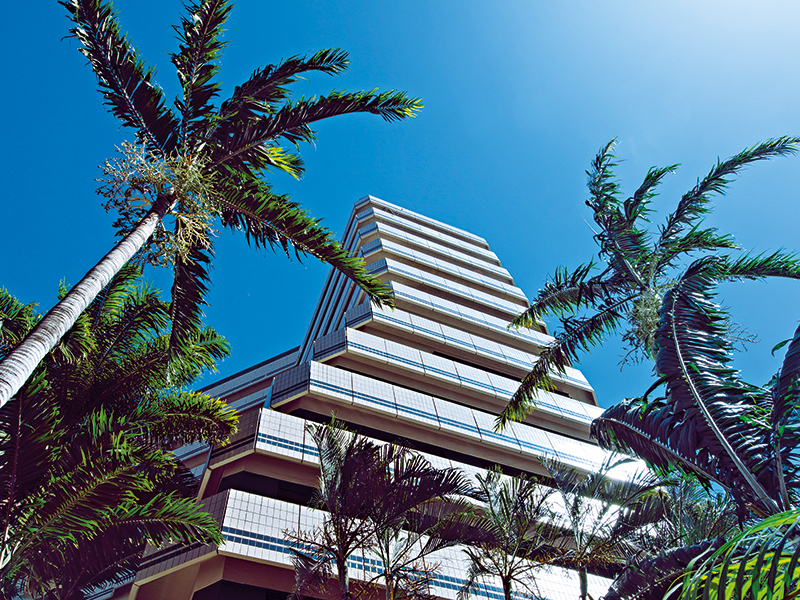Mauritian insurance sector spurred by digital developments
By embracing a wave of digital innovation, the Mauritian insurance industry is rapidly becoming one of the most dynamic markets in the world, writes Louis Rivalland, Group Chief Executive at Swan General

Mauritius is quickly gaining a reputation as one of the foremost financial hubs in Africa
Mauritius is more than just a holiday destination. While it’s true we are blessed with year-round sunshine, beautiful sandy beaches and exotic wildlife, there’s more to life on the island than tourism. In fact, the country’s broader economy has started to make a name for itself, with agriculture, manufacturing and retail all recording encouraging levels of growth in recent years.
Meanwhile, Mauritius is quickly gaining a reputation as one of the foremost financial hubs in Africa. The island’s political stability and business-friendly regulatory system have seen financial services flourish, and the insurance industry is proving particularly dynamic, displaying growth of more than five percent year-on-year.
However, the Mauritian insurance sector stands at something of a crossroads: new digital technologies are emerging, providing benefits and challenges in equal measure. Therefore, it is up to major players like Swan General to ensure this evolution is managed properly: minimising risk while maximising reward.
Digital upgrade
While Mauritius currently boasts the most competitive economy in Africa, the island must continue to identify new ways to conduct business and improve operational efficiency if it is to remain at the top of the pile.
In the insurance sector, for example, this development is coming in the form of emerging digital technologies; mobile applications are making the industry accessible to demographics that have traditionally struggled to get insurance, providing customers with more direct channels of communication. Similarly, big data is being coupled with telematics to give customers greater visibility and transparency.
At Swan, we’re always on the lookout for new technologies that can drive greater automation and enable our operations to be executed more efficiently. As such, Swan has developed a comprehensive digital strategy to better manage the rapid pace at which digitalisation is taking hold of our industry. This approach, along with the company’s reputation for excellent
service, will help take the customer experience to another level.
However, introducing new technology implies change, and change inevitably brings risk. If new technologies fall short of their promise, customer experience could suffer, placing a strain on the business.
Another risk is a lack of compliance: in the race to win customers with a seamless digital experience, incumbents could inadvertently ignore – or be less mindful of – the many compliance requirements currently in place to safeguard the industry.
International partnerships have been a key contributor to the development of Swan over the years
Playing by the rules
There are three main challenges currently facing the insurance sector in Mauritius. First, the speed at which regulatory changes are being made is increasing dramatically, impacting the way we conduct business both now and in the future. The second challenge revolves around recruiting talented individuals, and identifying people with the skill sets necessary to meet the evolving demands of the market. Finally, there are concerns regarding the impact technology is having on the actual boundaries of the industry.
Taken collectively, these challenges promise significant disruption for insurance firms throughout Mauritius. But disruption doesn’t necessarily lead to negative consequences; it can also present major opportunities for industry players, provided they’re able to enter the market quickly and define its parameters. However, in order to navigate this disruption effectively, businesses will need to be agile enough to cope with changing regulatory frameworks.
As recently as July, the Mauritian Financial Services Commission introduced new risk management regulations for insurers. The rules aim to establish a new culture for licensed insurers in terms of risk management, while simultaneously enhancing the observance of existing international norms. While a system of risk management was already in place at Swan, the new rules are helping to generate better awareness of the correlation between risk, capital and return, forcing us to be more focused on forward planning and strategic development.
The guidelines call for a change in the decision-making process. Managers and the board are reminded of their responsibility to ensure they’re properly assessing the impact of their decisions on the long-term sustainability of the enterprise. When properly implemented, the appropriate governance structure should enhance the internal control system and strengthen accountability. At the end of the day, this will benefit everyone.
Home and abroad
One of the ways the Mauritian insurance sector is able to stay ahead of the curve is by straddling domestic and international markets. Geographically, Mauritius benefits from being a midway point between African and Asian markets, but this is not the only reason the country is having a positive international impact.
New industry bodies are helping to promote Mauritius in various markets, while government legislation is enticing major players to use the country as a springboard for investment in other African nations. Further, domestic investors from the private sector are partnering with their counterparts from continental Africa to provide deeper regional synergies. At Swan Re, a subsidiary of Swan General, we provide a trustworthy way for insurers on the continent to channel their activities through protected cells.

Further, a number of structural, regulatory and logistical developments have created a supportive business climate in Mauritius. The island’s geographic location allows us to act as a conduit for trading in Africa; a position companies from all over the world are increasingly seeking to make use of. Moving forward, we expect progress in this area to continue, with further developments contributing significantly to our future economic performance.
International partnerships have been a key contributor to the development of Swan over the years. For example, much of what we do has been made possible through partnerships with professional reinsurers, including global market leaders Munich Re and Swiss Re, as well as regional leaders like Africa Re. We benefit from their financial strength, technical knowledge, new product development and training programmes.
Equally, international partnerships support local businesses seeking to extend their reach beyond our shores. As a matter of fact, several local businesses have been increasingly involved in such ventures, especially on the continent. Here at Swan, we believe there are still tremendous opportunities in some of Africa’s fastest-emerging economies, and that’s why we’re executing a strategy based on internationalisation.
Social investment
As well as developing the financial services sector in Mauritius, Swan also takes great pride in using the insurance sector as a vehicle for social good. We have always been actively engaged in community projects – whether in Mauritius or the wider world – implementing a number of social responsibility programmes as part of our corporate activities, and taking part in initiatives such as Earth Hour.
Swan also encourages its staff to commit to a number of philanthropic initiatives and, in 2009, the Swan Foundation was established to ensure Swan’s social and environmental responsibilities were being fulfilled in the most organised way possible. The foundation is managed by a corporate social responsibility committee, which is tasked with ensuring Swan’s social investments remain in line with current legislation, as stated in the annual budget speech presented by the Mauritian Minister of Finance.
Last year, Swan provided financial support totalling in the region of MUR 8.1m ($242,000) to some 57 NGOs, becoming involved in a number of initiatives relating to domestic industries, including education, socioeconomic development, health and the environment. Ultimately, we are committed to growing more than just our own company, and believe it’s our duty to consistently contribute to the betterment of the environment and society as a whole.













